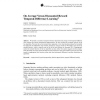Free Online Productivity Tools
i2Speak
i2Symbol
i2OCR
iTex2Img
iWeb2Print
iWeb2Shot
i2Type
iPdf2Split
iPdf2Merge
i2Bopomofo
i2Arabic
i2Style
i2Image
i2PDF
iLatex2Rtf
Sci2ools
135
Voted
ML
2002
ACM
2002
ACM
On Average Versus Discounted Reward Temporal-Difference Learning
We provide an analytical comparison between discounted and average reward temporal-difference (TD) learning with linearly parameterized approximations. We first consider the asymptotic behavior of the two algorithms. We show that as the discount factor approaches 1, the value function produced by discounted TD approaches the differential value function generated by average reward TD. We further argue that if the constant function--which is typically used as one of the basis functions in discounted TD--is appropriately scaled, the transient behaviors of the two algorithms are also similar. Our analysis suggests that the computational advantages of average reward TD that have been observed in some prior empirical work may have been caused by inappropriate basis function scaling rather than fundamental differences in problem formulations or algorithms.
Related Content
| Added | 22 Dec 2010 |
| Updated | 22 Dec 2010 |
| Type | Journal |
| Year | 2002 |
| Where | ML |
| Authors | John N. Tsitsiklis, Benjamin Van Roy |
Comments (0)

